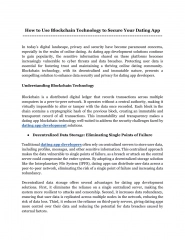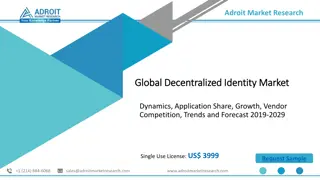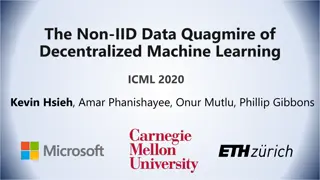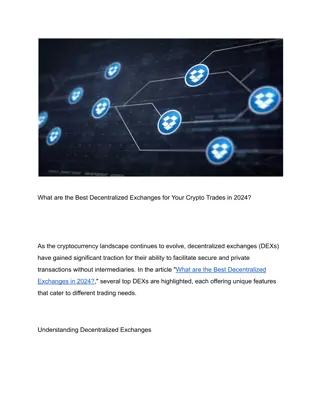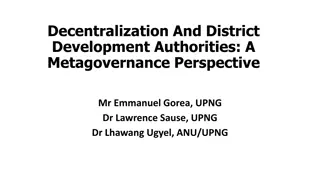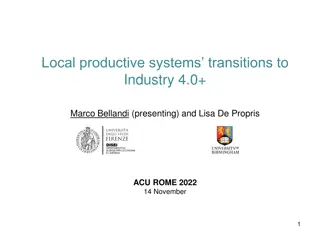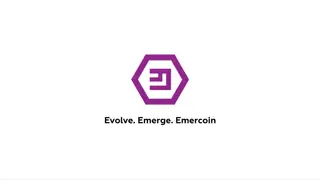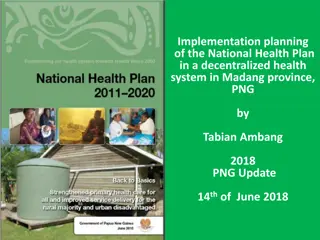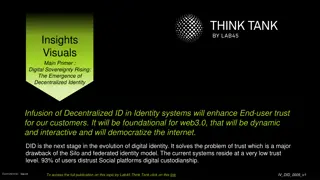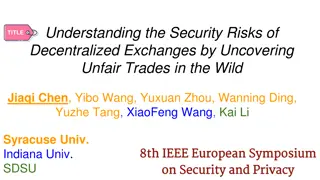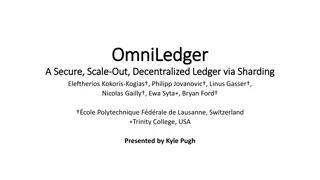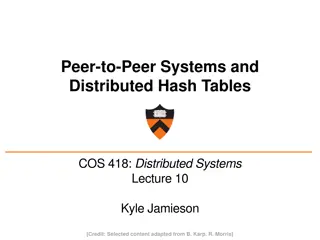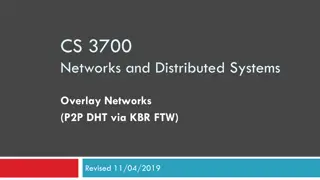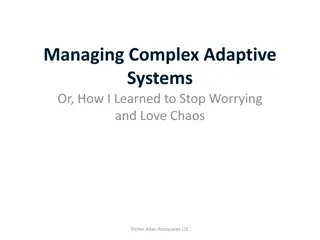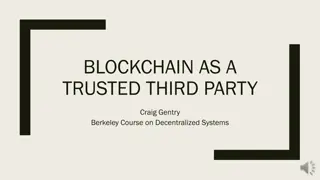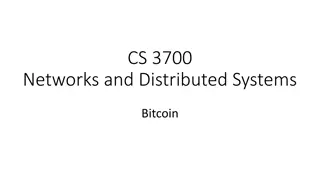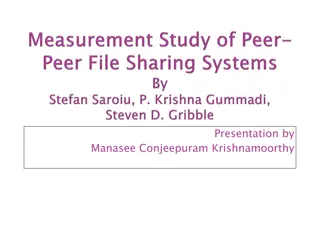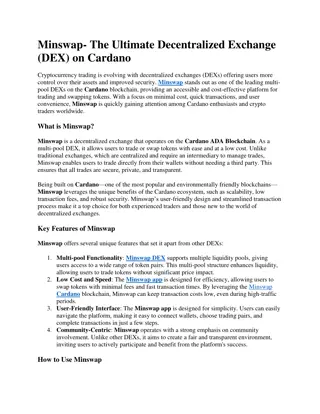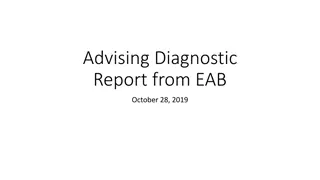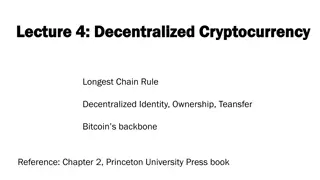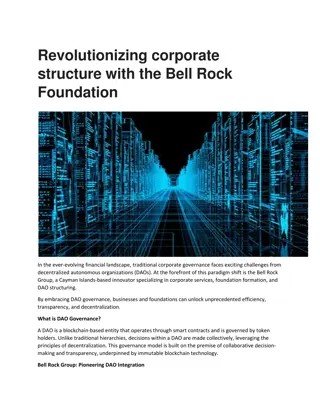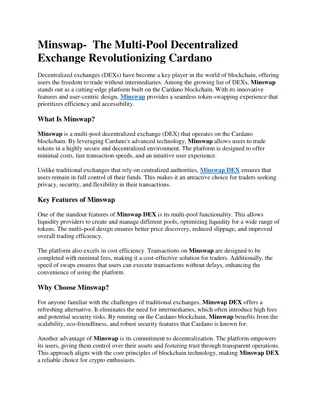How to Use Blockchain Technology to Secure Your Dating App Data
Discover the transformative power of blockchain technology in securing data for dating app development solutions. Eliminate single points of failure with decentralized storage, boosting redundancy. Ensure immutable integrity, preventing unauthorized modifications to user data. Facilitate secure mess
1 views • 4 slides
Explore Market-Up: The Decentralized Marketplace on Blockchain Technology
Market-Up is a decentralized marketplace leveraging blockchain technology, smart contracts, and TRON cryptocurrency for voucher creation, sales, and payments. Users can participate in marketing programs, attract customers, and earn income securely and transparently. Activate your account to join thi
1 views • 16 slides
Overview of Distributed Systems: Characteristics, Classification, Computation, Communication, and Fault Models
Characterizing Distributed Systems: Multiple autonomous computers with CPUs, memory, storage, and I/O paths, interconnected geographically, shared state, global invariants. Classifying Distributed Systems: Based on synchrony, communication medium, fault models like crash and Byzantine failures. Comp
9 views • 126 slides
Understanding Information Systems in Organizational Management
Management in organizations is divided into three levels: operational, tactical, and strategic. Each level requires different information systems to support various activities. Operational systems focus on routine transactions and control processes, while middle-level systems aid in semi-structured
9 views • 39 slides
Exploring Helium: A Decentralized IoT Network Revolution
Delve into the world of Helium, a blockchain-based IoT network revolutionizing connectivity. Managed by a community of crypto investors, this global network offers innovative solutions for telecom industry challenges through decentralized deployment and mining of HNT tokens.
0 views • 17 slides
Decentralized Identity Market size, share and forecast analysis 2019–2029
\nAdroit Market Research has included the Global Decentralized Identity Market\u00a0 research to its database in order to provide a thorough analysis of the variables driving a general market growth trend. The study contains a lot of information and is a useful tool for professionals in the field.
0 views • 5 slides
Understanding Different Types of Recommender Systems
Recommender systems play a crucial role in providing personalized recommendations to users. This article delves into various types of recommender systems including Collaborative Filtering, Content-Based, Knowledge-Based, and Group Recommender Systems. Collaborative Filtering involves making predicti
0 views • 7 slides
Introduction to Embedded Systems Design
Embedded Systems Design, Chapter 1 provides an insightful overview of embedded systems, distinguishing them from general-purpose computers. The chapter delves into the characteristics of embedded systems, their design considerations, and the various types of embedded computers such as general-purpos
1 views • 7 slides
Tackling Skewed Data Challenges in Decentralized Machine Learning
Addressing the critical issue of skewed data in decentralized machine learning, this work explores solutions to effectively handle non-iid data distribution, focusing on communication bottlenecks, data skewness, and proposing innovative approaches for decentralized learning over skewed datasets.
0 views • 26 slides
What are the Best Decentralized Exchanges for Your Crypto Trades in 2024?
As the cryptocurrency landscape continues to evolve, decentralized exchanges (DEXs) have gained significant traction for their ability to facilitate secure and private transactions without intermediaries. In the article \"What are the Best Decentrali
0 views • 5 slides
Decentralization and District Development Authorities: A Metagovernance Perspective
The study explores the impact of District Development Authorities (DDAs) on Papua New Guinea's decentralized governance system. It focuses on metagovernance issues such as coordination, leadership, and conflict resolution within the decentralized framework. The introduction, approach, and analysis p
0 views • 14 slides
Local Productive Systems Transitioning to Industry 4.0+: A Conceptual Framework
A conceptual framework explores factors influencing local productive systems (LPSs) transitioning to Industry 4.0+, emphasizing sustainability models vs. technocratic approaches. It delves into challenges of digital, social, and green transitions, advocating for innovation systems and cross-domain p
0 views • 19 slides
Decentralized Policies and Liability Laws in Environmental Protection
Explore the concept of decentralized policies in managing environmental pollution, focusing on liability laws, property rights, and voluntary actions. Discover how decentralized approaches offer advantages in addressing environmental externalities and how liability laws can change incentives for pol
1 views • 37 slides
Revolutionizing Communication with ENUMER: A Decentralized Approach
Traditional telephone systems rely on a chain of PSTN providers for call routing, leading to issues such as multiple re-codings and extra fees. ENUMER, a decentralized version of ENUM, offers a faster, more reliable, and cost-effective solution by allowing direct paths from buyer's PBX to seller, by
0 views • 12 slides
Implementation Planning of National Health Plan in Decentralized Health System, Madang Province, PNG
National Health Plan (NHP) is a crucial policy document for the health sector in Papua New Guinea, outlining government policy directions and priority areas for planning and service delivery. This study by Tabian Ambang in 2018 focuses on investigating the implementation planning of NHP in a decentr
0 views • 17 slides
Implementing Digital Product Passports: Best Practices and Standards Overview
This content provides insights into implementing Digital Product Passports (DPP) using decentralized identity standards. It includes key projects and partnerships focusing on identity and supply chain ecosystems, showcasing the benefits of a decentralized approach. The report emphasizes the importan
0 views • 8 slides
Establishment of Decentralized Clean Water Service Providers in Winooski Basin
The Clean Water Service Delivery Act of 2019 aims to establish a network of decentralized Clean Water Service Providers (CWSPs) for watersheds in Lake Champlain and Lake Memphremagog basins. CVRPC serves as the CWSP for the Winooski Basin, overseeing projects like stormwater management, natural reso
0 views • 5 slides
Decentralized Identity: Enhancing Trust in Web3.0 with DID
The emergence of Decentralized Identity (DID) is set to revolutionize digital identity systems by enhancing end-user trust, solving trust issues in current models, and paving the way for Web3.0. DID prevents forgery, eliminates passwords, and boosts operational efficiency. However, key obstacles lik
0 views • 5 slides
Water Resources Commission Overview and Operations
This document provides an overview of the Water Resources Commission (WRC), focusing on training needs assessment objectives, staff strength, professional capacity, organizational structure, and decentralized operations. The WRC plays a key role in managing water resources, with a diverse team of pr
0 views • 7 slides
Uncovering Security Risks in Decentralized Exchanges
This study explores the security risks associated with decentralized exchanges (DEX) by investigating unfair trades that occur in these platforms. Through analyzing various scenarios, the research sheds light on potential vulnerabilities that traders may face in DEX environments. Key findings highli
0 views • 20 slides
Information Systems in Organizations: Overview and Implementation
Information systems play a crucial role in organizations, encompassing transaction processing systems, functional area information systems, and enterprise resource planning systems. This content delves into the purpose of transaction processing systems, the support provided by information systems ac
0 views • 30 slides
OmniLedger: Decentralized Ledger with Sharding
OmniLedger is a decentralized ledger using sharding to enhance scalability without compromising security. It addresses challenges such as validator selection, cross-shard transactions, and checkpointing. The proposed solution includes ByzCoinX for consensus and Atomix for atomic commit. Goals includ
0 views • 13 slides
Overview of Peer-to-Peer Systems and Distributed Hash Tables
The lecture discusses Peer-to-Peer (P2P) systems and Distributed Hash Tables, exploring their architecture, benefits, adoption in various areas, and examples such as BitTorrent. It covers the decentralized nature of P2P systems, the challenges they address, and the advantages they offer including hi
0 views • 56 slides
Evolution of Peer-to-Peer Networks and Distributed Hash Tables
Peer-to-peer networks and distributed hash tables have evolved significantly over the years, from the early days of ARPANET to the emergence of decentralized systems like Chord, Kelips, and Dynamo. This evolution has brought about a shift towards greater decentralization, improved scalability, and e
0 views • 39 slides
Precolonial Administration in Nigeria: Governance Systems and Structures
Nigeria's precolonial era was characterized by diverse societies with various governance structures such as the centralized Hausa/Fulani system and decentralized systems. Different kingdoms and empires existed, each with its unique social organization, political leadership, and economic activities.
0 views • 22 slides
Overlay Networks and Consistent Hashing in Distributed Systems
Understanding the concept of overlay networks and consistent hashing in distributed systems is crucial for scalability and efficient data storage. Overlay networks like P2P DHT via KBR offer a decentralized approach for managing data while consistent hashing provides a balanced and deterministic way
0 views • 36 slides
Navigating Complexity: Leadership and Management in Adaptive Systems
Explore the dynamic world of complex adaptive systems, where traditional command-and-control methods fall short. Learn the value of decentralized management, hybrid organizational structures, and the essential skills needed to thrive in a networked environment. Embrace chaos, foster creativity, and
0 views • 27 slides
Exploring the Role of Blockchain as a Trusted Third Party in Decentralized Systems
Blockchain technology serves as a decentralized and cryptographic Trusted Third Party (TTP) by enhancing trust, immutability, and censorship resistance in transactions. By distributing trust and utilizing cryptographic protocols, blockchain mitigates the need for a centralized authority, offering a
0 views • 30 slides
Comparison of Unitary, Confederation, and Federal Government Systems
The unitary government system centralizes power in the central government, confederation delegates power to local governments, and federal shares power between levels of government. Examples like Saudi Arabia (unitary), confederation (decentralized power), and the USA (federal) showcase these system
0 views • 36 slides
Understanding Currency Evolution: From Physical to Electronic
Explore the evolution of currency from physical to electronic forms, covering the history of currency, the role of trust, advantages and disadvantages of physical currency, and insights into electronic currency systems like credit cards and PayPal. Discover how centralized and decentralized systems
0 views • 50 slides
Understanding Embedded Systems and Cyber-Physical Systems
Embedded systems are specialized computer systems embedded within larger systems, such as control systems and car controllers. This lecture covers real-time aspects, applications of Cyber-Physical Systems (CPS), and examples like the Boeing 777/Airbus A380 cockpit. It discusses the design process of
0 views • 22 slides
Evaluating Peer-Peer Systems in Distributed Architectures
Abundant research is being conducted in peer-peer architectures, focusing on evaluating peers to understand system effectiveness. The lack of such assessments led to a detailed study on organizing peers in decentralized systems like Napster and Gnutella. The process involved crawling systems to meas
0 views • 43 slides
Understanding Git: An Overview of Version Control Systems
Git is a powerful version control system that facilitates collaborative work and maintains a comprehensive history of project changes. It offers both Centralized and Decentralized/Distributed systems, with advantages and drawbacks for each. Centralized systems rely on a central server for collaborat
0 views • 37 slides
Challenges and Solutions in Municipal Finance & Local Fiscal Systems
Cities worldwide are facing challenges in funding urban infrastructure while adapting to population growth. A framework for fiscal health is crucial to support sustainable development goals. Key elements include fiscal performance, regulations governing municipal finance systems, and decentralized f
0 views • 18 slides
Minswap- The Ultimate Decentralized Exchange (DEX) on Cardano
Minswap- The Ultimate Decentralized Exchange (DEX) on Cardano
0 views • 2 slides
Enhancing Advising Practices at ETSU: A Diagnostic Report
EAB's diagnostic report on advising at ETSU identified opportunities to improve the student advising experience. Key observations included a decentralized structure leading to inconsistent experiences, highlighting the need for a more standardized advising model. Recommendations proposed a decentral
0 views • 20 slides
Decentralized Cryptocurrency and Blockchain Technology
Exploring the concepts of decentralized cryptocurrency, the longest chain rule, ownership transfer, and ScroogeCoin within the context of blockchain technology. Detailed explanations on creating coins, transactions, blocks, and the formation of a tamper-resistant blockchain. The centralization aspec
0 views • 15 slides
Decentralized Biowaste Management for Sustainable Resource Valorization
The Decisive Final Conference presented a project focusing on decentralized biowaste management to collect and valorize biowaste from major producers. The project aimed to address challenges in biowaste processing and resource recovery. Key aspects included the difference between planned and actual
0 views • 13 slides
Bellrock Group - DAO-Enabled Foundations: Empowering Decentralized Governance
Bellrock Group specializes in DAO-enabled foundations, offering legal and organizational frameworks that support decentralized autonomous organizations' growth and success. Our expert team helps DAOs navigate the complexities of governance, liability
1 views • 2 slides
Minswap- The Multi-Pool Decentralized Exchange Revolutionizing Cardano
Minswap- The Multi-Pool Decentralized Exchange Revolutionizing Cardano
0 views • 4 slides
